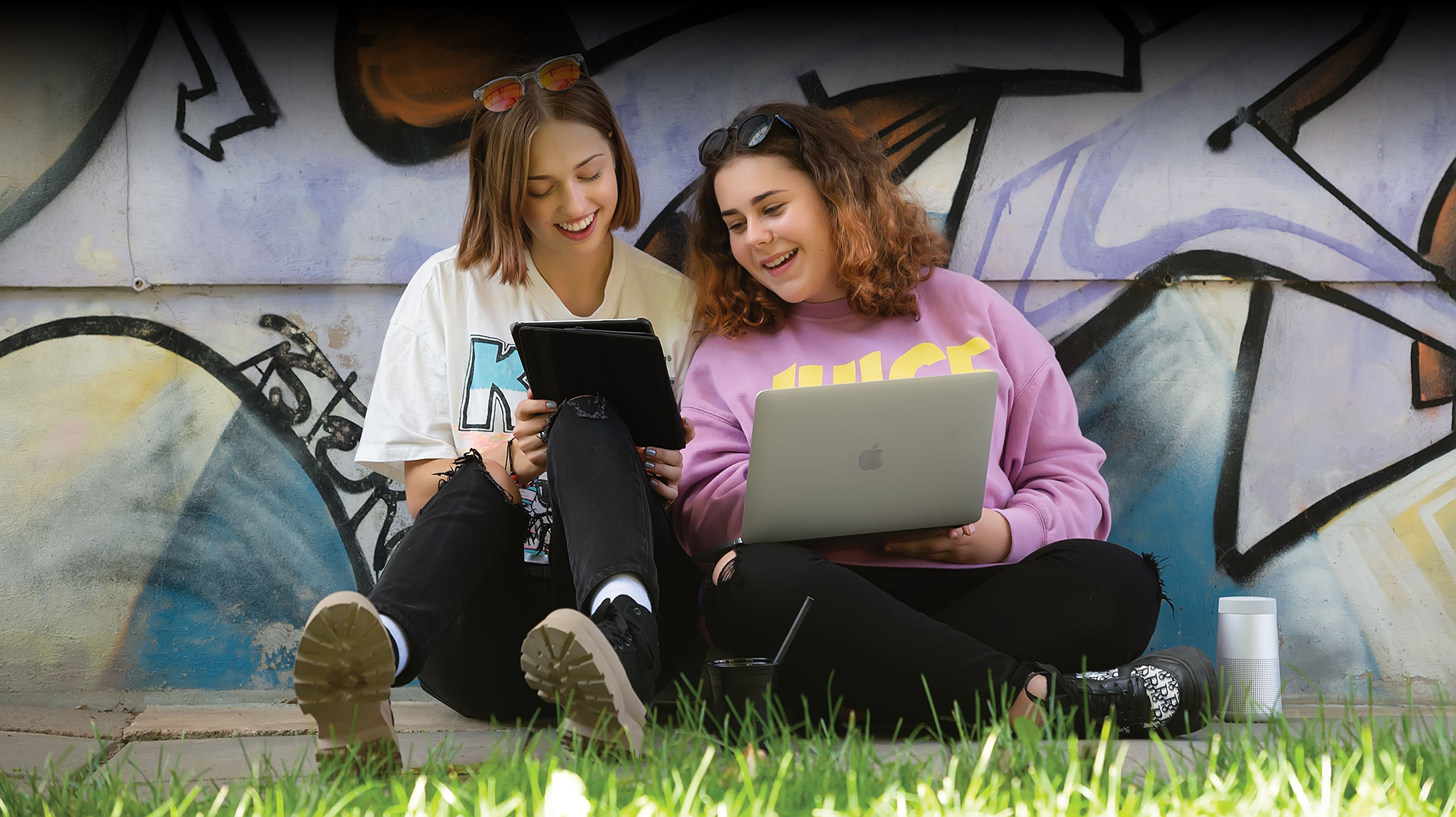Multiplier events happening in 4 partner countries
End of June and begginning of July was dedicated to Multiplier events happening in 4 partner countries: Lithuania, Slovenia, Greece and Portugal. The main objective of these events was to share the results of the international project SparkDigiGirls and present created new program Unleash your creativity with IT.
Events were a great success as more than 100 participants have attended. Participants ranged from teachers, school staff to representatives of various IT organizations, youth workers and girls. Partners from Portugal had a full day of activities, where first part of the day was dedicated to presented technologies: AR, robotics and etc. While afterwards round table discussion and various presentations followed. Lithuanians, Slovenians and Greeks also had presentation dedicated to the project SparkDigiGirls and other similar initiatives for girls to encourage their interest in technologies and choose their path in STEM after graduating high school. All countries had fruitful discussions which continued after the event as well.
Unleash your creativity with IT program is available for girls, youth workers and anyone interested. It can be found at: https://moodle.digigirls.eu/
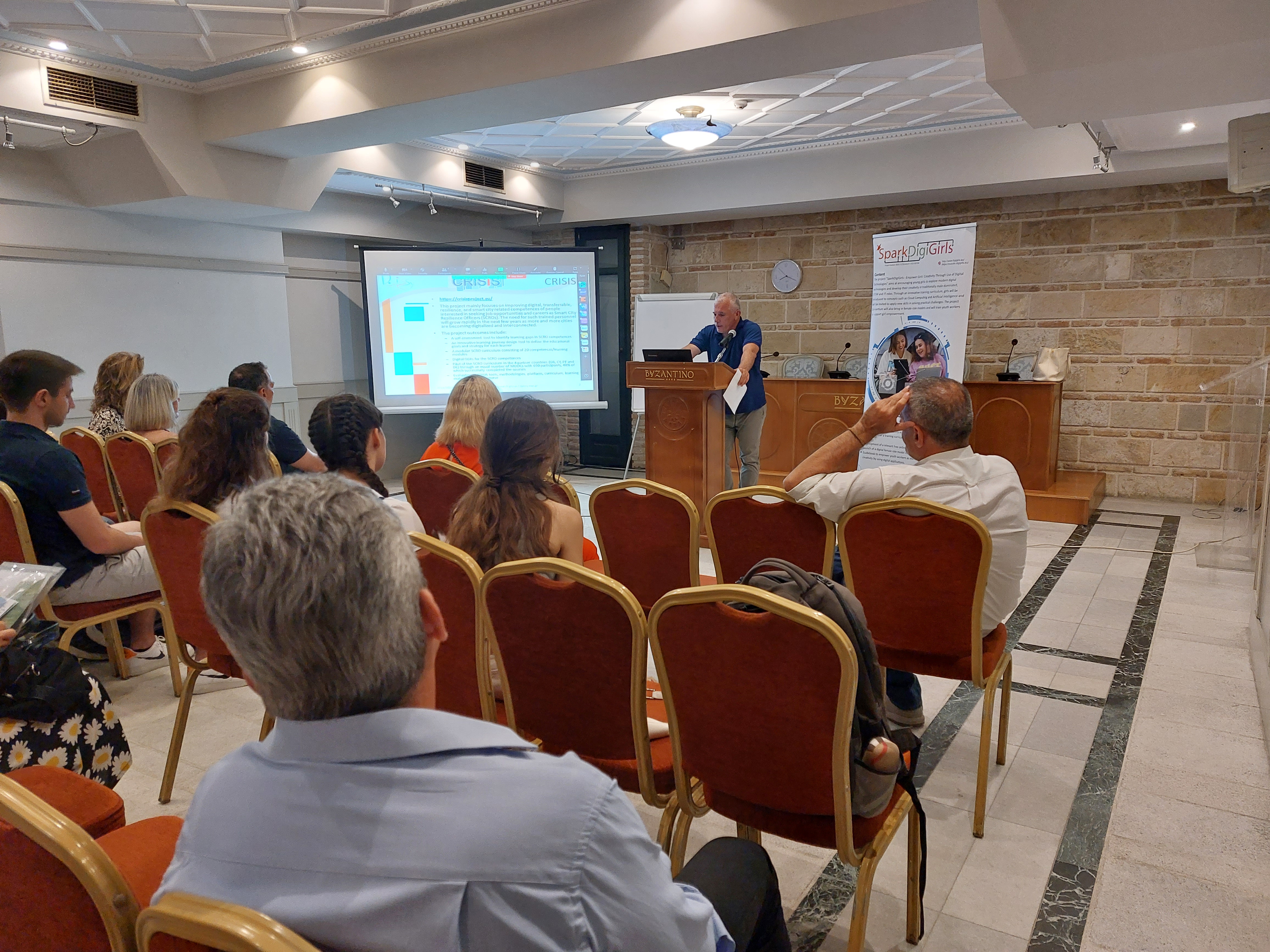
The three most prominent messages of the event
✅ IT is one of the most open fields for both girls and guys.
✅ Underneath the IT sector there are many different and creative jobs.
✅ It is worthwhile for non-formal education providers to make efforts to find and develop new teaching tools that show the younger generation how technology works and what it can be used for.
29 June The RIAP Association invited representatives from various fields to an event on "How to use technology to develop a creative young generation of girls". The two-year international project "Unleash your creativity with technology (SparkDigiGirls)" and its results were presented to the gathering of IT teachers, representatives of municipalities, IT companies, universities and other non-governmental organisations.
The project team sought to answer the question of why girls are losing interest in technology and came up with a range of solutions, from research to the development of a new non-formal education curriculum, "Unleash your creativity with technology". This distance learning programme is one of the key results of the SparkDigiGirls project. It offers a unique approach, combining several different technologies to find solutions to relevant life situations that young people often face.
The distance learning programme is designed for non-formal education, but can also be used in formal education settings. The aim of the programme is to help girls aged 14 years and older ('learners') to creatively and innovatively address different situations in their daily lives through technology and to make them more attractive to girls.
The distance learning programme consists of 16 distinct learning strands called Challenges. Each challenge covers a specific topic or area of interest to girls aged 14+. For example, fashion, design, the environment, cooking, art, etc. Each challenge has two main interlinked components: technology (artificial intelligence, augmented reality, internet of things, coding, 3D modelling and printing, cloud computing, blockchain) and real-life situations/problems that young girls face in their daily lives. For example, how to make a birthday present in 3D, how to design clothes using coding, how to create a CO2 footprint, how to create a culinary website, how to create your own NFT and many other interesting challenges.
The event also showcased initiatives and projects that engage and teach girls to use technology in a meaningful way.
Link to the distance learning programme: https://moodle.digigirls.eu/.
Project Youtube channel: https://www.youtube.com/@SparkDigiGirls1
Project Instagram account: https://www.instagram.com/sparkdigigirls/
#SparkDigiGirls; #Erasmus
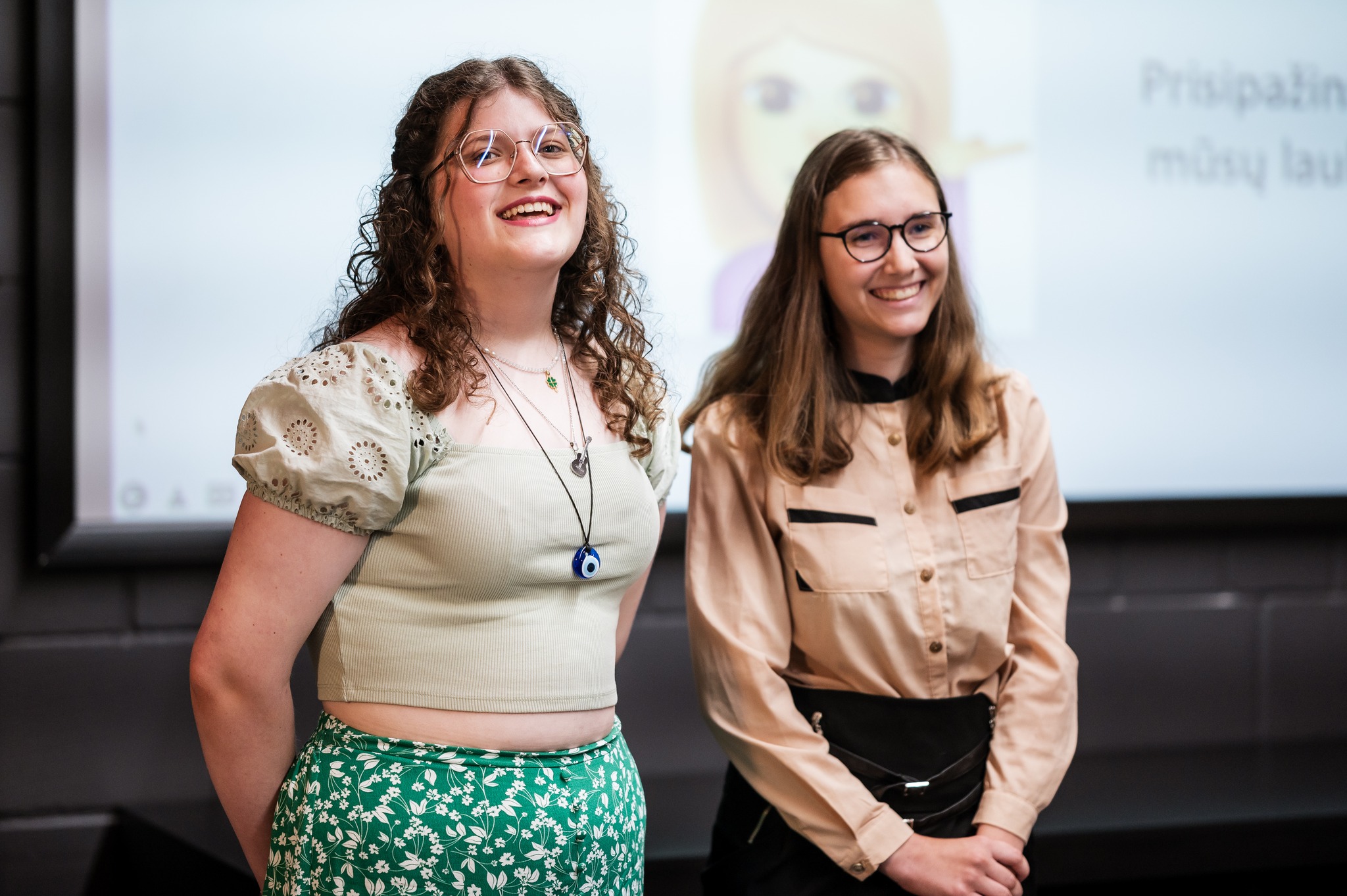
"Spark IT up!" training in Slovenia
From 24-28 April this year, 16
girls and 8 youth workers from Lithuania, Slovenia, Portugal and Greece took
part in the five-day "Spark IT up!" Ljubljana, Slovenia. This
international learning training activity is one of the last planned activities
of the project SparkDigiGirls www.digigirls.eu.
The main objective of this
learning activity was to empower girls and youth workers on how to become
ambassadors and flag-bearers of the newly developed distance learning programme
Unleash Your CreativITy with Technology in their own communities, and how to
get as many girls as possible interested in the world of technology.
All five days of the training
went by in a flash. It was of utmost importance to the organisers to create a
friendly and open environment for all members of the group from the very first
minute of the training. Therefore, the first day of the training was dedicated
to getting to know the participants and creating a safe space for learning.
Using different youth work methods, the girls and youth workers introduced
themselves and got to know each other. The second day of the training included
a presentation of different digital technologies such as artificial
intelligence, 3D printing, augmented reality and other technologies.
Participants also visited the Jožef Stefan Institute, one of the most renowned
research institutes in Slovenia. There, they heard a lecture on artificial
intelligence, how it is changing our world and were invited to try out
chemistry experiments. On the third and fourth days of the training, the
participants, divided into different teams, focused on creative tasks. The aim
of the tasks was to come up with creative solutions for each of the partner
countries on a given topic and the proposed technologies, such as AR, AI, cloud
computing, etc. The girls came up with some great stuff. For example, they
created a modern prototype of an ancient Greek shoe using artificial
intelligence applications and uploaded a text and image using an augmented
reality application. Using the Scratch programming environment, they created an
interactive recipe for the Lithuanian dish "Šaltibarščiai". During
the training, the girls were also invited to learn about Arduino
microcomputers, how they work and what they can be used for. This activity was
presented by the representatives of the "Girls do code" academy in
Slovenia. The last day of the training was dedicated to the creation of digital
content, the evaluation of the training, the awarding of certificates to the
participants and a farewell party.
At the end of the training
activities, the girls and youth workers were asked to fill in a training
evaluation form. The evaluations show that the training was successfully
implemented. In their evaluations, the participants stressed the usefulness of
technology in finding solutions in real-life situations. "Through this
project, I realised that the IT world is very diverse. I learnt a lot of new
things: augmented reality, 3D modelling and printing, graphics, video editing
and even programming. And what surprised me the most was that everything is not
as complicated as it seemed. You just need do not afraid, try and it will all
work out. It was fun!" (Lithuania).
Participants also made meaningful
connections and had great moments during the training and met their peers from
different European countries. "It was so exciting when we found out that
our team had won the competition and would be going to Slovenia! It was my
first trip abroad and I had such a great time interacting and collaborating
with girls from Portugal, Greece and Slovenia." (Lithuania). "The
SparkDigiGirls project will remain in my memory and in my heart. It gave me a
lot of useful knowledge, helped me improve my teamwork skills and introduced me
to other cultures. I am very grateful for the opportunity to learn and discover
so many useful things" (Greece).
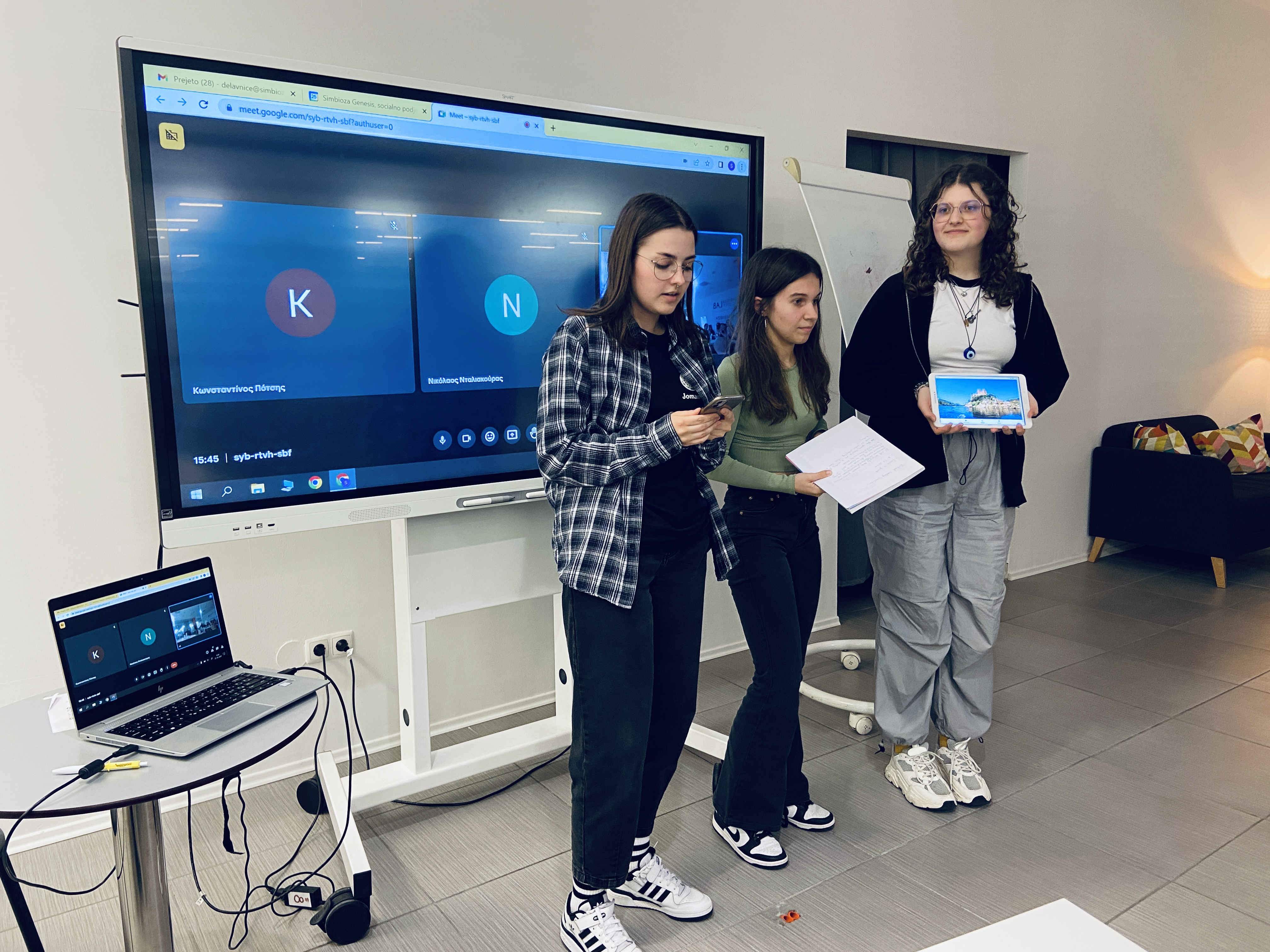
How can we increase girls' interest in the world of technology at school?
How can we increase girls' interest in the world of
technology already at school?
The European Year of Skills officially
started on 9 May 2023. To contribute to skills development the Digital Skills and Jobs Platform team,
together with the European Commission (EC), organised an award competition and
selected the project Empower Girls’ Creativity Through Use of Digital
Technologies (SparkDigiGirls, www.digigirls.eu) as a finalist for the European
Digital Skills Awards 2023 in the category Youth in the digital world. This is
one of the five categories announced, with a total of 330 applications for this
competition.
"Our project is unique because it combines
three different elements: technology, creativity and girls. We are very proud
of the EC assessment. We are the only one from Lithuania to make it to the
finals," says Laura Grinevičiūtė, director of the Rural Internet Access
Points Association.
This award confirms the relevance of the chosen
project theme - the under-representation of girls in IT. According to Eurostat
2021 data, women represent only 19% of all IT students in the EU. In Lithuania,
the proportion of women studying IT is around 23%, in Greece 21%, in Portugal
20% and in Slovenia 17%.
The main reasons influencing low interest of girls
in technologies
Research has shown that in primary education, boys
and girls are almost equally likely want to work in technology-related fields.
However, girls' attitudes and opinions change later in life and they are more
likely to choose careers in the social sciences, humanities and medicine than
in IT, engineering or mathematics.
There are many reasons for the lack of interest in
IT. Negative beliefs and stereotypes about technology, such as "IT is a
man's job", "IT is just coding", influence girls' choices.
The lack of examples of successful women in IT also
contributes to girls' low interest in IT. In addition, girls do not understand
the opportunities offered by the IT sector and therefore do not take advantage
of them. "Girls think that people who work in IT sit in front of a
computer screen from morning until late at night and code. But this is a myth.
There are many different and creative jobs in the IT sector, such as graphic
designer, data analyst, engineer, IT project manager, etc.," says Renata
Danielienė, a lecturer at the Kaunas Faculty of Vilnius University.
Technology can help unleash creativity
In response to the need to increase girls' interest
in the world of IT, partners from Lithuania, Portugal, Slovenia and Greece have
launched a two-year international project funded by the Erasmus+ Strategic
Partnership Programme for Youth.
The project aims to engage girls aged 14 and over
in the latest technologies (such as artificial intelligence, augmented reality,
Internet of Things, programming) by integrating a creative approach and
demonstrating how technology can be used in everyday activities.
Programme Unleash Your CreativITy with technology
The project developed online learning programme Unleash Your CreativITy with Technology.
The aim of the programme is to engage girls aged 14-18 in a hands-on,
experiential learning model to solve various life situations and problems
through the practical use of modern technologies such as artificial
intelligence, augmented reality, programming, blockchain and cloud computing.
"Today, we are witnessing an evolution from
complex programming languages to intuitive systems that do not require deep and
prior knowledge. This is the model we have chosen for this project. Online
tools, apps and mobile applications help to increase girls' motivation to
learn, creativity, interest in technology and understanding of its practical
benefits," says Renata Danieliene.
Between January and March this year, 279 girls from
Lithuania, Portugal, Slovenia and Greece took part in the pilot training of the
app. The distance learning programme consists of 16 separate learning paths, called
challenges. Each challenge covers a specific topic or area of interest to girls
aged 14 and over. For example, fashion, design, environment, cooking, art, etc.
Each challenge has two key interwoven components: technology (artificial
intelligence, augmented reality, internet of things, coding, 3D modelling and
printing, cloud computing, blockchain) and real-life situations/problems that
girls face in their everyday lives. For example, how to make a birthday present
in 3D, how to design clothes using programming, how to learn about carbon
footprint, how to create a culinary website, how to create your own NFT and
many other interesting challenges.
Each challenge is implemented with specific steps.
The girls are introduced to almost 30 different online tools, apps and mobile
applications. By following the steps and interactive tasks, they will know
exactly where to start and how to complete the challenge. The programme is
available free of charge to all registered users via the Moodle platform in up
to five languages.
What
does it take to change girls' attitude?
In addition to online learning programme, the
project partners organised a number of engaging activities. "During the
project, it was very important for us to show girls that there are women
working in IT. We made videos, organised different discussions in schools,
organised online events, international learning activities, managed an Instagram
account so that girls could get to know the women, their stories, interesting
jobs, specialities in IT, etc." - Says Laura Grinevičiūtė, director of the
association.
We hope that the results of the project will help
to break down prejudices and stereotypes and increase girls' interest in the
world of technology.
.png)
Visit to Kelme
The RIAP Association team was delighted to meet the girls taking part in the challenge of the remote programme Empower Girls Creativity Through Use of Digital Technologies (SparkDigiGirls). This time we met the girls in Kelme, at the J. Graičiūno gymnasium. We also invited the other participants from Kražantė pprogymnasium to this school.
We talked about how the girls are doing with the challenges, which technologies are the most interesting and which are the most difficult. It turns out that the girls were interested in augmented reality tools such as ScatchAR, Artivive and the artificial intelligence applications Aiva and HitPaw. They learnt about these tools for the first time and tried them out in practice by completing different challenges. The 3D modelling and printing challenges proved to be among the most challenging. It's a fun idea to create a 3D gift for a friend on your own, but you need to work and "tame" the 3D modelling programmes and 3D printers.
We share the work from the challenges on our Instagram account SparkDigiGirls. Join in!
International project funded by #Erasmus
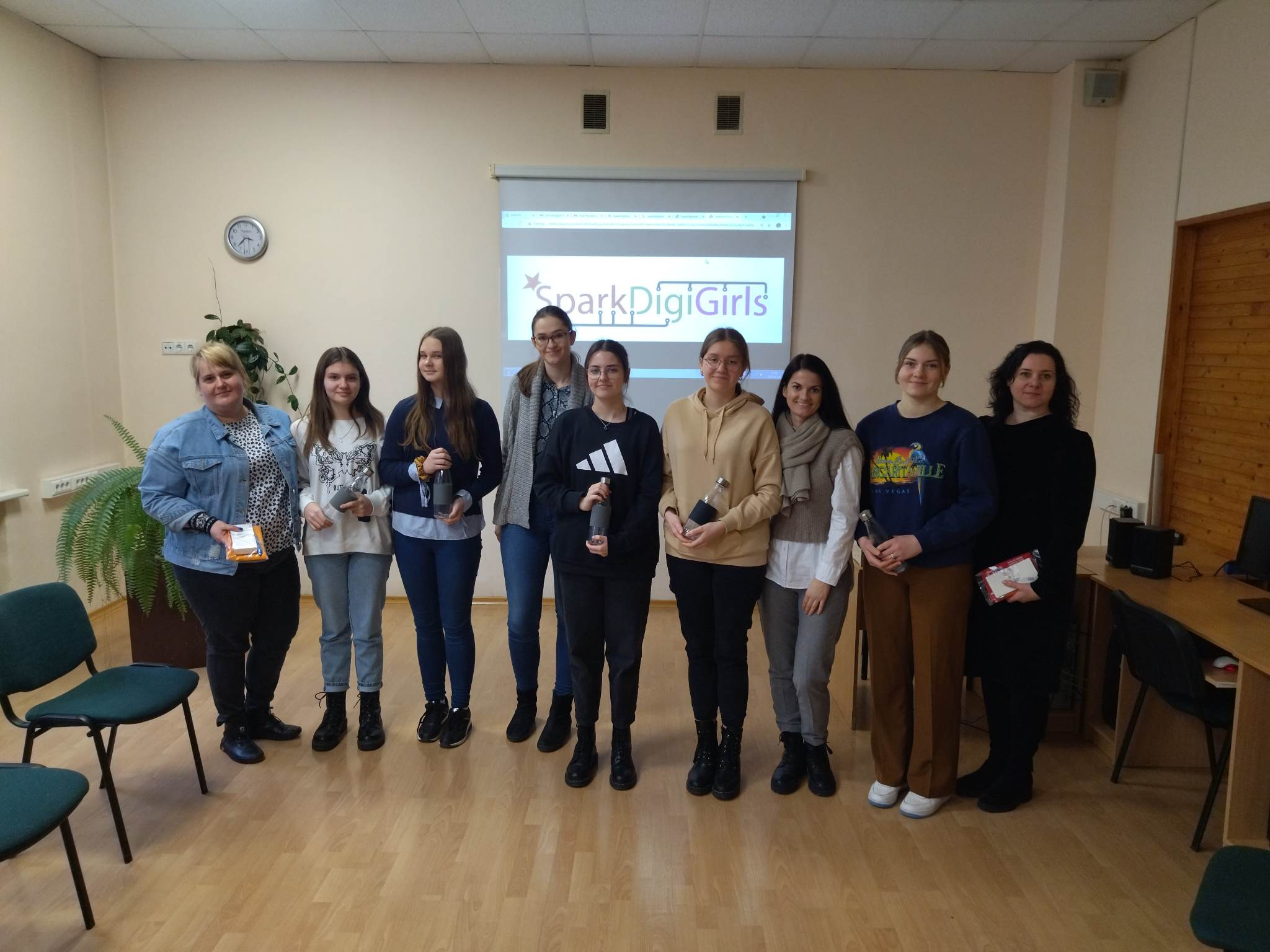
Don't fall for online scams!
Safer Internet Week continues this week in Lithuania and across Europe. On 8 February, the RIAP Association together with its partner the Institute of Information Technology organised an international remote hackathon. It invited participants from Slovenia, Lithuania, Greece and Portugal to join the SparkDigiGirls project. More than 200 girls are currently trying out the newly developed "Technology Unleashes the Imagination" programme.
Between January and March, the girls take part in this programme, where they complete challenges that test technologies such as artificial intelligence, augmented reality, the Internet of Things, coding, 3D modelling and printing, cloud computing, blockchain. They learn how they work and, most importantly, how they can use them in their daily lives.
This time, in celebration of Safer Internet Week, the girls were invited to try out various interactive activities related to Internet safety. They rewrote situations with the help of Emogi, searched for answers to questions related to online fraud during a quiz, and tried a whole range of new tools such as slides, jumbo boards and others.
You can follow the girls' challenges and work in progress on the SparkDigiGirls Instagram account.
.png)
